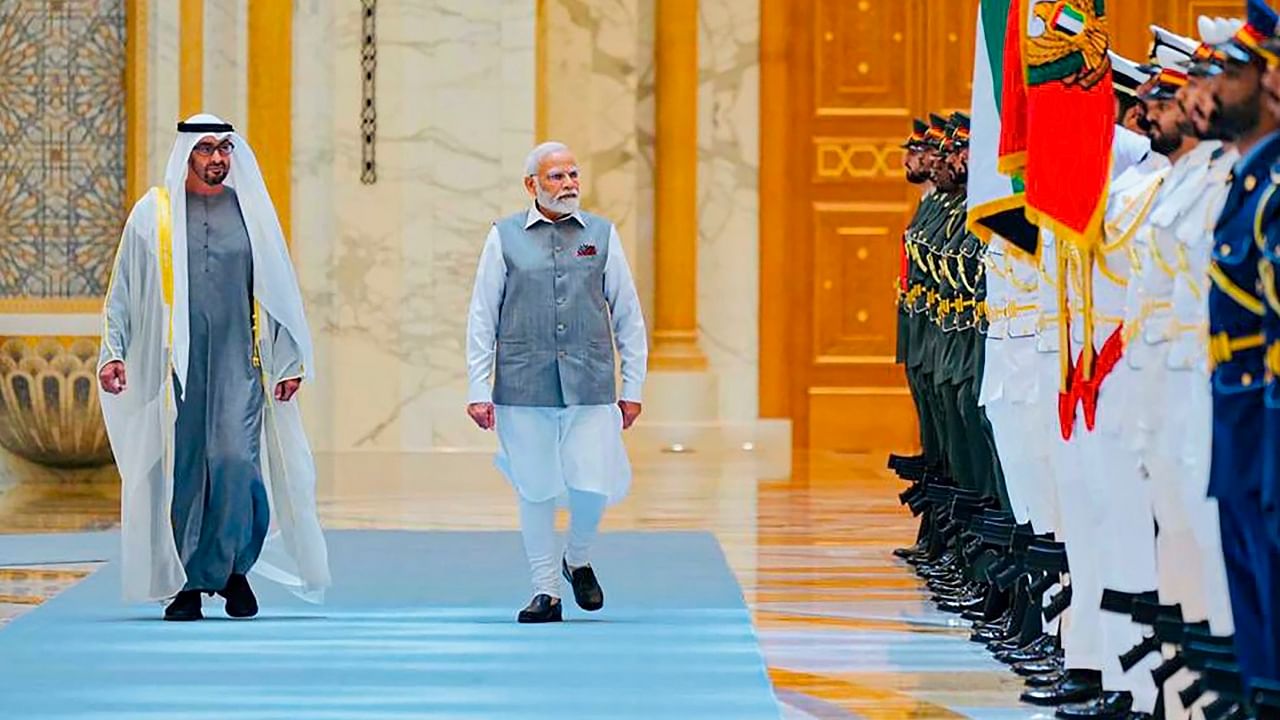
With Prime Minister Narendra Modi visiting Abu Dhabi, India and the United Arab Emirates (UAE) on Saturday inked agreements to start trade settlement in their respective national currencies – Rupee and Dirham – as well as to link their fast payment systems to make international financial interactions simpler.
Modi’s meeting with the President Sheikh Mohamed bin Zayed Al Nahyan of the UAE also saw the two sides signing another agreement for opening a campus of the Indian Institute of Technology Delhi (IIT-Delhi) in Abu Dhabi.
The prime minister visited Abu Dhabi while returning from Paris to New Delhi. He was welcomed by the UAE president at the airport.
The two leaders adopted two joint statements, including one specifically focussing on cooperation on climate change. They underscored the urgent need for developed countries to fulfil the $100 billion delivery plan and highlighted the importance of the global stocktake of collective action to achieve the goals of the Paris Agreement.
The UAE will host the 2023 United Nations Climate Change Conference (UNFCCC COP28) in Dubai later this year.
Modi noted that India and the UAE trade witnessed a 20 per cent increase since the signing of the Comprehensive Economic Partnership Agreement last year. "For the first time, we have achieved $85 billion in trade and soon we will achieve the target of $100 billion. If we decide, we can cross this milestone before the G20," the prime minister said as he and the UAE president witnessed the exchange of the MoUs.
Shaktikanta Das, the governor of the Reserve Bank of India (RBI), and his counterpart at the Central Bank of UAE (CBUAE), Khaled Mohamed Balama, signed the Memorandum of Understanding (MoU) for establishing a framework to promote the use of local currencies, the Indian Rupee (INR) and the UAE Dirham (AED), for cross-border transactions.
The MoU, the first of its kind, is aimed at putting in place a Local Currency Settlement System (LCSS) to promote the use of INR and AED bilaterally. It covers all current account transactions and permitted capital account transactions. The creation of the LCSS would enable exporters and importers to invoice and pay in their respective domestic currencies, which in turn would enable the development of an INR-AED foreign exchange market. “This arrangement would also promote investments and remittances between the two countries. Use of local currencies would optimise transaction costs and settlement time for transactions, including for remittances from Indians residing in UAE,” the RBI stated in a press release.
A gold exporter of the UAE was the first user of the newly created LCSS for a transaction of Rs 12.84 crore for 25 kgs of gold.
“Congrats to Peekay Intermark Ltd. & (and) @YESBANK for being the 1st users for settling their gold transaction in INR under the newly set up Local Currency Settlement system (between India and the UAE),” tweeted New Delhi’s diplomatic mission in Abu Dhabi.
The MoU on ‘Payments and Messaging Systems’ will set the stage for linking the Fast Payment Systems (FPSs) of the two nations – the Unified Payments Interface (UPI) of India with the Instant Payment Platform (IPP) of UAE. It will link the respective Card Switches (RuPay switch and UAESWITCH). It will also explore the linking of the Structured Financial Messaging System or SFMS of India with the messaging system in the UAE.
The UPI-IPP linkage will enable the users in either country to make fast, convenient, safe, and cost-effective cross-border funds transfers, the RBI stated. The linking of Card Switches will facilitate the mutual acceptance of domestic cards and the processing of card transactions. The linkage of messaging systems is aimed to facilitate bilateral financial messaging between the two countries, added the central bank of India.
